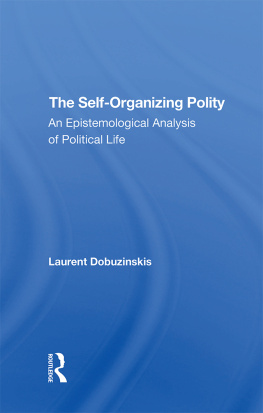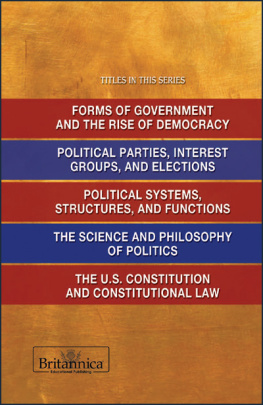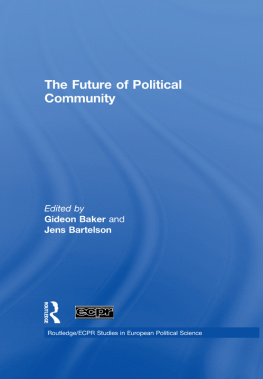The Self-Organizing Polity
About the Book and Author
Is the study of living systems a useful metaphor for political science? In this book, Dr. Dobuzinskis argues for further exploration of biopolitical models to explain the complexity of political theory and social change. His discussion emphasizes the new cybernetics, which considers not only self-regulating but also self-organizing or self-producing systems. Self-organizing systems operate in an autonomous sphere comparable to the autonomy of the political community and the political actors who compose this community. The autonomy of these systems is maintained through dynamic equilibration processes that entail not only the preservation of a given structure but also, at crucial times, the creative rearrangement of the existing structure and its transformation into a new pattern of relations. From this perspective, a political crisis is both a threat to the political system and the occasion of its renewal; stability may also mean decay.
Emphasizing the links that have developed historically between the natural and social sciences, this book is a reflection on the merits of and difficulties involved in representing the evolutionary process at the political level as the problematic reproduction of national communities and states.
Laurent Dobuzinskis is an assistant professor of political science at Simon Fraser University in Canada.
The Self-Organizing Polity
An Epistemological Analysis of Political Life
Laurent Dobuzinskis
First published 1987 by Westview Press, Inc.
Published 2019 by Routledge
52 Vanderbilt Avenue, New York, NY 10017
2 Park Square, Milton Park, Abingdon, Oxon OX14 4RN
Routledge is an imprint of the Taylor & Francis Group, an informa business
Copyright 1987 Taylor & Francis
All rights reserved. No part of this book may be reprinted or reproduced or utilised in any form or by any electronic, mechanical, or other means, now known or hereafter invented, including photocopying and recording, or in any information storage or retrieval system, without permission in writing from the publishers.
Notice:
Product or corporate names may be trademarks or registered trademarks, and are used only for identification and explanation without intent to infringe.
Library of Congress Cataloging-in-Publication Data
Dobuzinskis, Laurent.
The self-organizing polity.
Bibliography: p.
Includes index.
1. Biopolitics. 2. Political science. I. Title.
TA80.D63 1987 320'.01'547 86-28261
ISBN 13: 978-0-367-29573-8 (hbk)
To those who have encouraged and facilitated what might have seemed my never-ending pursuit of this work, I offer my most sincere gratitude. In particular, I have benefitted immensely from the critical comments made by the members of my dissertation committee at York University as this book evolved from my doctoral dissertation: Professor H. Michael Stevenson, Professor David V.J. Bell, Professor Harold Kaplan and Professor Paul Medow. I would like also to thank the anonymous reviewer to whom a first draft of this book was submitted by Westview Press. The responsibility for any error or omission remains mine and only mine, of course.
I am grateful also to Barbara Barnett, who typed the last two versions through which this work has gone. But my most onerous debt is to my wife, Joan, who held the fort while I was "working on my book."
Laurent Dobuzinskis
The Self-Organizing Polity
My purpose here is to evaluate critically both the methods and the subject matter of political science. Political scientists spend probably as much time writing about the methodology of political science as they do writing about politics. Some may think that this is unfortunate. But such an inclination is the inescapable consequence of the nature of our ill-defined subject matter. Methodological reflection is necessary for ensuring that what we write about is relevant to the concerns of those who are engaged in political activities and continually reproduce the political structures that sustain political life. This book is precisely an attempt to consider political life as a series of complex processes that the life sciences can help us to understand more fully.
Theoretical research of this kind must, of course, be informed by a discussion of concrete realities. The post-behavioralist movement has rightly denounced the tendency to postpone the analysis of emerging political issues until that time when they can be explained by means of a fully developed theoretical framework. Contemporary issues such as the crisis of the nation-state and the politics of man's relation with nature will be addressed. However, I argue that theoretical research ought not only to be practically relevant, but also to be epistemologically relevant, by which I mean that it should address the problems that pose a challenge to the dominant scientific paradigms.
Finally, there is a moral dimension inherent in any theoretical inquiry. I am concerned in particular with the reduction of reason to instrumental rationality which, in practice, takes the form of a confusion of the good with the imperatives of technology. Although the relationship between science, technology, and moral or religious values remains more complex than it is sometimes claimed to be by critics of our technocratic age, it is also true that the technological Zeitgeist, as it were, acts as a powerful leveler. As far as politics is concerned, one of the most far-reaching technological developments of the last two decades has been the tremendous progress of informational technology and its transformation into a kind of "decisional technology" that has had a decisive impact on public policy-making. It has contributed to the opinion of the technocratic elite that politics is a derivative, if not altogether dysfunctional, activity. My contention is, however, that in theoretical cybernetics we can find powerful arguments against the manipulative practices that we have come to associate with applied cybernetic techniques of decision-making in large bureaucracies. I do not intend to show that "pure" cybernetic theory has become the victim of unscrupulous technicians motivated only by the pursuit of selfish gains, for there are clear, logical connections between some theoretical principles in cybernetics and the technocratic ideal of a rationalized, centralized mode of societal control. But there are several distinct trends in theoretical cybernetics, some of which point towards a radical critique of both science and society.
Political scientists interested in systemic and cybernetic analogies have almost completely ignored the second generation of cybernetic models whose origins are traced hereafter. They are aimed at the formalization of the "problem of order"the perennial problem of articulating and ranking the principles that give a meaning to the inner and outer realities of our lives. Of course, the problem of order has always been a concern for philosophy, but with the new cybernetics it has become a concern for science qua science.
Twenty years after the publication of the first edition of Karl Deutsch's The Nerves of Government , it may sound trite to claim again that cybernetics can make a contribution to the scientific study of politics and to the practical application of scientific knowledge to policy-making. But I will argue that the second generation of cybernetic models pose new questions and suggest new answers. The first three chapters of this book provide an in-depth analysis of their substantive content but, to avoid any misunderstanding, a brief historical account of their development is in order here.











